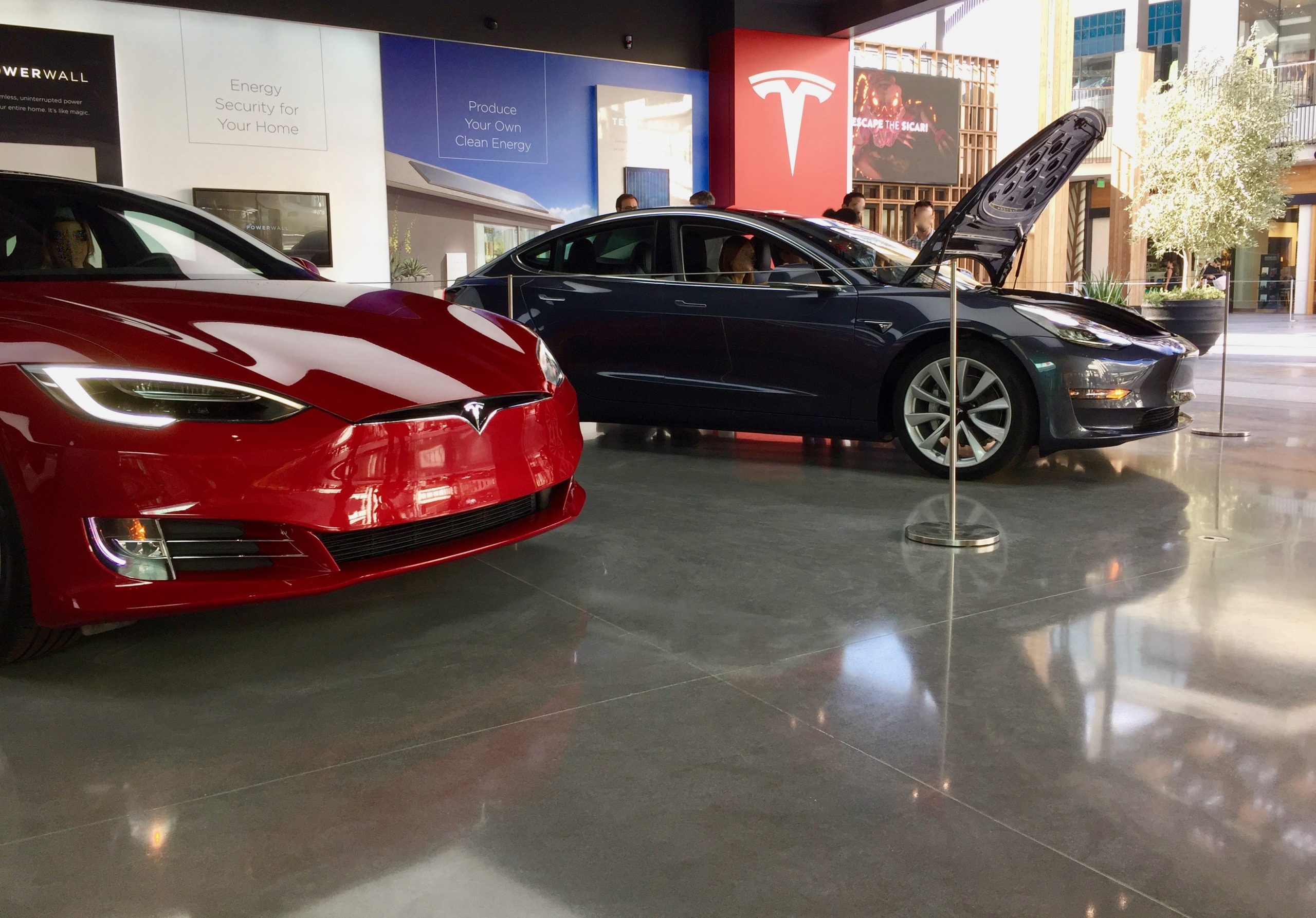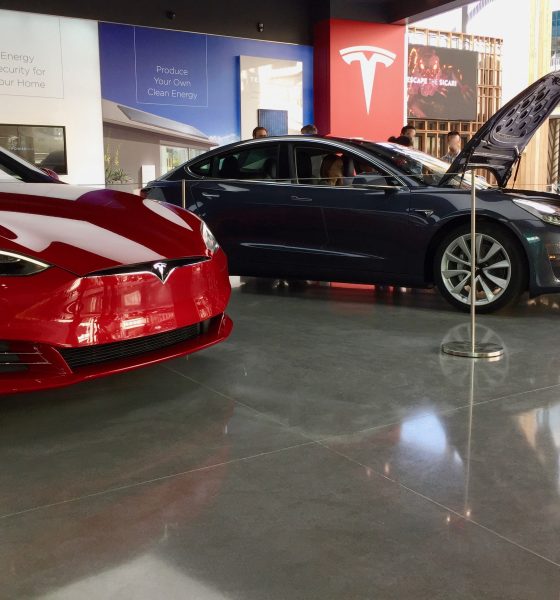

News
Tesla’s win in Michigan marks a point of no return for traditional auto
After resisting Tesla for years, the heart of American auto, Michigan, finally allowed the electric car maker to establish a foothold in the state. It was a hard-fought battle for Tesla, and a victory well worth more than CEO Elon Musk’s one-word celebration on Twitter. But at the same time, Tesla’s settlement with Michigan, which would allow the company to sell and service its cars in the state, marks a point of no return for traditional auto.
It may not be evident now, but from this point on, it will be twice as difficult for states to resist disruptive new EV makers that do not follow a traditional dealership sales model. This means that even other carmakers such as Rivian will likely have a clear path forward in their expansion into the United States’ auto market, absent of the direct sales roadblocks that the Elon Musk-led company has dealt with for years.
Michigan is considered the heart of the US auto industry, and for good reason. The country’s motoring history was written within the state’s borders, and iconic companies that changed the industry, such as Ford, call Michigan their home. Yet, for all its dedication to the car industry, Michigan has also been very resistant to Tesla, preventing the electric car maker from selling its vehicles in the state due to the company’s direct sales strategy.
Tesla’s difficulties in Michigan were a painful reminder that the company’s goal of transitioning the transportation industry towards sustainability would be marred with difficulties left and right, signified by the state’s dealer franchise laws. This is one of the reasons why the company’s settlement with the state is so important. Daniel Crane, a University of Michigan law professor who specializes in antitrust and regulatory issues, explained these points in an interview with Automotive News.
“The handwriting’s on the wall for the franchised dealer as the exclusive way consumers interact with car companies. It’s pretty clear it’d be impossible for the state to deny someone else; it paves the way for any new EV company that doesn’t want to use traditional dealerships.”
“The legacy companies can’t continue forever to use a dealer model from the 1930s. Being required to use only that, I think, is a competitive disadvantage. They’ll have to find a way to get flexibility in their distribution method, or they’ll be left behind,” he said.
The dealer model deserves some recognition, as the United States’ auto industry would likely not have gotten this far without it. Yet in the age of electrification, dealerships, which are known for their flexible pricing strategies and reliance on regular vehicle maintenance, are starting to become outdated. Tesla is the living representation of this, as the company’s cars are priced like tech devices, and its vehicles require far less maintenance compared to internal combustion cars.
One key takeaway from Tesla’s conquest and subsequent victory in Michigan is the fact that the electric car maker is only the first of many. The state has allowed the company to sell and service its cars within its borders, and it will be hard-pressed to not do the same for other automakers. Tesla may be leading the charge, after all, but it is not alone. There’s Rivian, which is also planning on adopting a non-dealership sales model, and more are likely coming. By allowing Tesla to sell and service its cars within the state, Michigan has just accelerated the industry’s transition to sustainability.
Very few may see it now, but through this little settlement with Tesla, the US auto industry may have just passed the proverbial point of no return.
Tesla’s recent settlement with the state of Michigan can be read below.
Tesla-MI-Joint Stipulation and Motion for Entry of Dismissal 1-22-20 679161 7 by Simon Alvarez on Scribd

News
Tesla ships out update that brings massive change to two big features
“This change only updates the name of certain features and text in your vehicle,” the company wrote in Release Notes for the update, “and does not change the way your features behave.”

Tesla has shipped out an update for its vehicles that was caused specifically by a California lawsuit that threatened the company’s ability to sell cars because of how it named its driver assistance suite.
Tesla shipped out Software Update 2026.2.9 starting last week; we received it already, and it only brings a few minor changes, mostly related to how things are referenced.
“This change only updates the name of certain features and text in your vehicle,” the company wrote in Release Notes for the update, “and does not change the way your features behave.”
The following changes came to Tesla vehicles in the update:
- Navigate on Autopilot has now been renamed to Navigate on Autosteer
- FSD Computer has been renamed to AI Computer
Tesla faced a 30-day sales suspension in California after the state’s Department of Motor Vehicles stated the company had to come into compliance regarding the marketing of its automated driving features.
The agency confirmed on February 18 that it had taken a “corrective action” to resolve the issue. That corrective action was renaming certain parts of its ADAS.
Tesla discontinued its standalone Autopilot offering in January and ramped up the marketing of Full Self-Driving Supervised. Tesla had said on X that the issue with naming “was a ‘consumer protection’ order about the use of the term ‘Autopilot’ in a case where not one single customer came forward to say there’s a problem.”
This was a “consumer protection” order about the use of the term “Autopilot” in a case where not one single customer came forward to say there’s a problem.
Sales in California will continue uninterrupted.
— Tesla North America (@tesla_na) December 17, 2025
It is now compliant with the wishes of the California DMV, and we’re all dealing with it now.
This was the first primary dispute over the terminology of Full Self-Driving, but it has undergone some scrutiny at the federal level, as some government officials have claimed the suite has “deceptive” names. Previous Transportation Secretary Pete Buttigieg was one of those federal-level employees who had an issue with the names “Autopilot” and “Full Self-Driving.”
Tesla sued the California DMV over the ruling last week.
News
Tesla workers push back against Giga Berlin unionization
“IG Metall did not succeed in Giga Berlin‘s works council election earlier today. The union share was reduced from nearly 40% in 2024 to 31% in 2026! This is a clear message by the Giga Berlin team towards an independent co-determination! The list called Giga United, led by the current chairwoman, Michaela Schmitz, received the most votes with more than 40%! Good news for Giga Berlin!”

Tesla workers pushed back against unionization efforts at Gigafactory Berlin, and over the past few years, there has been a dramatic decrease in interest to unionize at the German plant.
Gigafactory Berlin Plant Manager André Thierig announced on Wednesday that IG Metall, the European union group, saw its share reduce from 40 to 31 percent in 2026 as employees eligible to vote on the issue. Instead, the Giga Berlin team, known as Giga United, received the most votes with more than 40 percent.
BREAKING! 🚨
IG Metall did not succeed in Giga Berlin‘s works council election earlier today. The union share was reduced from nearly 40% in 2024 to 31% in 2026!
This is a clear message by theGiga Berlin team towards an independent co-determination!
The list called Giga…
— André Thierig (@AndrThie) March 4, 2026
Thierig gave specific details in a post on X:
“IG Metall did not succeed in Giga Berlin‘s works council election earlier today. The union share was reduced from nearly 40% in 2024 to 31% in 2026! This is a clear message by the Giga Berlin team towards an independent co-determination! The list called Giga United, led by the current chairwoman, Michaela Schmitz, received the most votes with more than 40%! Good news for Giga Berlin!”
There were over 10,700 total employees who were eligible to vote, with 87 percent of them turning out to cast what they wanted. There were three key outcomes: Giga United, IG Metall, and other notable groups, with the most popular being the Polish Initiative.
The 37-seat council remains dominated by non-unionized representatives, preserving Giga Berlin as Germany’s only major auto plant without a collective bargaining agreement.
Thierig and Tesla framed the outcome as employee support for an “independent, flexible, and unbureaucratic” future, enabling acceleration on projects like potential expansions or new models. IG Metall expressed disappointment, accusing management of intimidation tactics and an “unfair” campaign.
The first election of this nature happened back in 2022. In 2024, IG Metall emerged as the largest single faction with 39.4 percent, but non-union lists coalesced for a majority.
But this year was different. There was some extra tension at Giga Berlin this year, as just two weeks ago, an IG Metall rep was accused by Tesla of secretly recording a council meeting. The group countersued for defamation.
Tesla Giga Berlin plant manager faces defamation probe after IG Metall union complaint
This result from the 2026 vote reinforced Tesla’s model of direct employee-management alignment over traditional German union structures, amid ongoing debates about working conditions. IG Metall views it as a setback but continues advocacy. Tesla sees it as validation of its approach in a competitive EV market.
This outcome may influence future labor dynamics at Giga Berlin, including any revival of expansion plans or product lines, which Musk has talked about recently.
News
SpaceX President Gwynne Shotwell details xAI power pledge at White House event
The commitment was announced during an event with United States President Donald Trump.

SpaceX President Gwynne Shotwell stated that xAI will develop 1.2 gigawatts of power at its Memphis-area AI supercomputer site as part of the White House’s new “Ratepayer Protection Pledge.”
The commitment was announced during an event with United States President Donald Trump.
During the White House event, Shotwell stated that xAI’s AI data center near Memphis would include a major energy installation designed to support the facility’s power needs.
“As you know, xAI builds huge supercomputers and data centers and we build them fast. Currently, we’re building one on the Tennessee-Mississippi state line. As part of today’s commitment, we will take extensive additional steps to continue to reduce the costs of electricity for our neighbors…
“xAI will therefore commit to develop 1.2 GW of power as our supercomputer’s primary power source. That will be for every additional data center as well. We will expand what is already the largest global Megapack power installation in the world,” Shotwell said.
She added that the system would provide significant backup power capacity.
“The installation will provide enough backup power to power the city of Memphis, and more than sufficient energy to power the town of Southaven, Mississippi where the data center resides. We will build new substations and invest in electrical infrastructure to provide stability to the area’s grid.”
Shotwell also noted that xAI will be supporting the area’s water supply as well.
“We haven’t talked about it yet, but this is actually quite important. We will build state-of-the-art water recycling plants that will protect approximately 4.7 billion gallons of water from the Memphis aquifer each year. And we will employ thousands of American workers from around the city of Memphis on both sides of the TN-MS border,” she noted.
The Ratepayer Protection Pledge was introduced as part of the federal government’s effort to address concerns about rising electricity costs tied to large AI data centers, as noted in an Insider report. Under the agreement, companies developing major AI infrastructure projects committed to covering their own power generation needs and avoiding additional costs for local ratepayers.








